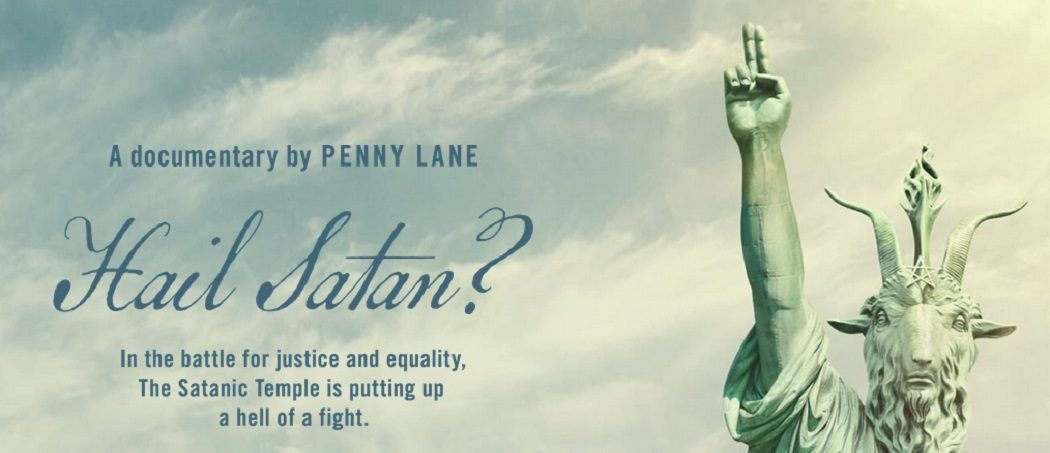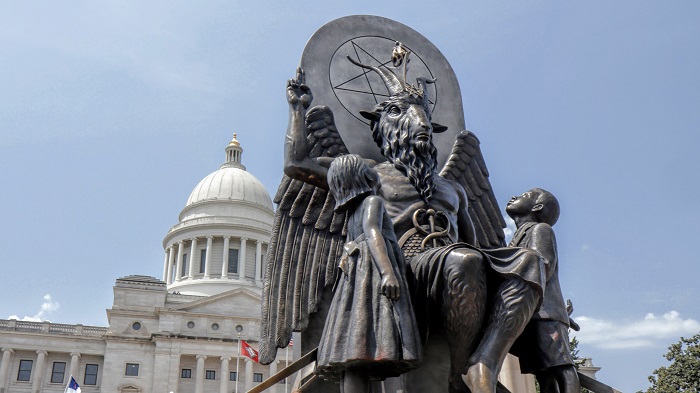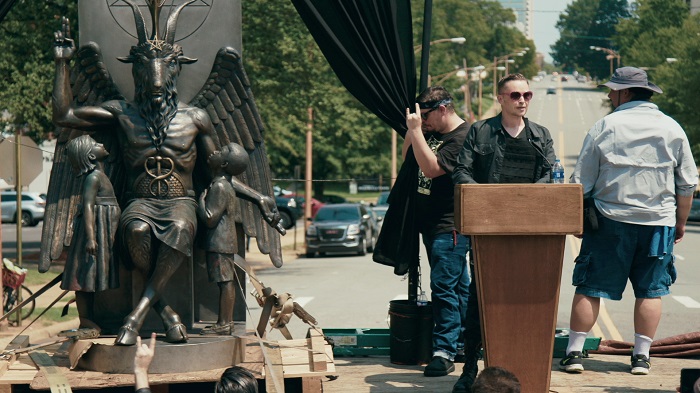
Documentary Filmmaker Penny Lane Provides an Insider's Look at the Satanic Temple in Hail Satan?
Hail Satan? is not a documentary on the Church of Satan; it dives into the Satanic Temple, a religious activist group.
There are a lot of misconceptions and misinformation in the world when it comes to Satanism. And that’s why the documentary Hail Satan? is here to clear the air. Sort of.
Hail Satan? follows the exploits of the Satanic Temple, which is a nontheistic religious organization based in Salem, Massachusetts that should not be confused with the Church of Satan. In fact, the two groups are not friends, and neither appreciates being confused with the other.

Anyway, the Satanic Temple is more of an activist organization than they are a church, fighting for religious freedom in America. But they do it in ways that show how ludicrous and paradoxical Christianity can be.
For example, wherever there is a statue or monument that honors the Ten Commandments on government property, the Satanic Temple will sue to have a statue of Baphomet, an ancient goat-headed deity sometimes associated with the Devil, erected right next to it. Wherever prayer is being taught in schools, the Satanic Temple will show up and introduce satanic prayer. Basically, they fight for the rights of the citizens of America to not have Christianity shoved down their throats as the only option for religion.
Hail Satan? is a surprisingly thoughtful insider’s look at the organization. Director Penny Lane (Nuts!) follows around the Temple’s spokesperson, a weirdly charismatic (although creepy looking) dude named Lucien Greaves, as the group stages rallies and spreads their message of religious freedom. The Satanic Temple has very little to do with Satan, qualifying their name by claiming that the word “satan” simply means “the adversary” (and by explaining that the name “Satanic Temple” was not taken when they did their legal due diligence).
The whole group seems to exist solely with the purpose of pissing off hard-core Christian bible-beaters. Sort of like a Westboro Baptist Church that uses their powers for good instead of evil. They’re trying to give civics lessons to government officials who really need them.

Although it is hardly the objective of Hail Satan? to convert people to Satanism, the film unintentionally makes a pretty good case for it. At one point, members of the church recite the Seven Tenets of Satanism, and frankly, these tenets make way more sense than the Ten Commandments. Whereas the Commandments are common sense things that any good person should not have to be told are the right things to do, the Tenets are creeds by which to live a better life.
For example, “One should strive to act with compassion and empathy toward all creatures in accordance with reason” is a much better manifesto than “thou shalt not murder.” Of course one shouldn’t murder. No one should have to be told that. Compassion towards all creatures should be taught to all, Christian, Satanist, or whatever.
It’s not supposed to be a comedy, but there is an air of farce to Hail Satan?, mainly because the opposition that the Satanic Temple faces at every turn is so misguided and the Temple takes it all in stride. Everywhere they go, they are met by bible-thumping crybabies who want to force Christianity on the world, people who miss the point completely. The members of the Satanic Temple do not necessarily want to preach Satanism, they just want to make sure that everyone has the option to practice whatever religion that they see fit. They believe in religious pluralism, and therefore, they strive for the re-evaluation of the United States as a Christian nation. And they are not violent at all. In fact, the film shows the excommunication of a founding member who calls for the assassination of Trump during a service.

Much of this review sounds like an advertisement for the Satanic Temple. And truthfully, it’s hard not to root for Lucien Greaves and his squad. They take their mission way more seriously than they take themselves, and that’s what makes them likeable. They really do come off as heroes, even as their opponents verbally condemn them to hell. At one point a reporter asks Greaves “is this a hoax?” And Greaves, to his credit, admits that much of what they do takes the form of publicity stunts. But the key word is publicity. They’re calling out a system that, in their minds, needs to be called out. And by their reasoning (and remember, “compassion and empathy in accordance with reason”), they are right. They’re not infringing on anyone else’s religious freedoms. They’re fighting for their own.
The real kicker to the movie comes when it is revealed that many of the monuments to The Ten Commandments that have been erected on government property were placed there to promote the 1956 Cecil B. DeMille epic with which they share their name. Suddenly, the hypocrisy of an institution that was behind the Satanic Panic of the eighties (which the movie rightfully compares to the Salem Witch Trials of the seventeenth century) worshipping a movie promotional item becomes clear.

Hail Satan? doesn’t really answer many of the questions that its audience may have about Satanism, but that’s because the Satanic Temple isn’t really what most people would consider a Satanic organization. That’s what a documentary about The Church of Satan would be for. What Hail Satan? does is give the viewer a fascinating glimpse into the workings of a religious activist group. And that question mark at the end of the title is intentional, because the movie – and the Satanic Temple – comes with a nod and a wink.


